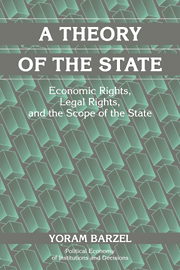Book contents
- Frontmatter
- Contents
- Preface
- 1 Introduction
- I The Emergence of Protection and Third-Party Enforcement
- II The Emergence of Legal Institutions
- III The Character of the State
- 12 Merger and Local Autonomy
- 13 The Distinction between “Legitimate” and “Criminal” States
- 14 Power, Violent Conflict, and Political Evolution
- 15 The Time Path of Change under Dictatorships and under Rule-of-Law Regimes
- 16 Recapitulation and an Epilogue
- References
- Index
- Other Books in the Series
14 - Power, Violent Conflict, and Political Evolution
Published online by Cambridge University Press: 04 December 2009
- Frontmatter
- Contents
- Preface
- 1 Introduction
- I The Emergence of Protection and Third-Party Enforcement
- II The Emergence of Legal Institutions
- III The Character of the State
- 12 Merger and Local Autonomy
- 13 The Distinction between “Legitimate” and “Criminal” States
- 14 Power, Violent Conflict, and Political Evolution
- 15 The Time Path of Change under Dictatorships and under Rule-of-Law Regimes
- 16 Recapitulation and an Epilogue
- References
- Index
- Other Books in the Series
Summary
Power plays a curious role in economists' attempts to formulate a theory of the state. North (1981) and Olson (1982), two of the more prominent economists who have written on the state, do not give power much of a role. North, for instance, initially brings up the importance of power. In summarizing his discussion, however, he does not even refer to power, but rather states that the ruler is subject to “a competitive constraint and a transaction cost constraint” (p. 28). Olson (1993) introduces the notion of the power of a “roving bandit” who, like the dictator I have discussed (Barzel, 2000a), turns into a “stationary bandit.” But neither he nor I have explored the role of power itself.
Umbeck (1981) seemingly was the first modern economist to construct a model of the state that starts from a “primitive” beginning. In his model, “might makes right”; individuals' power determines everything. Power is also the central force in the accounts of many historians and political scientists. I concur with Umbeck that individuals' power determines the initial distribution of wealth, but the picture changes as Umbeck's model is extended to accommodate specialization.
Individually, specialized protectors have more power than others do. When power is delegated to specialized agents, others must deal with the problem of preventing the agents from taking over and becoming principals themselves. However, physical power, along with other personal attributes, such as cunning, that individuals possess, will predominate only until cooperation emerges. Given the trade-off opportunities between wealth and power, then as wealth is accumulated, sheer physical power will quickly recede to share or even yield center stage to the power that organizations control. I focus in this chapter on two issues related to power.
- Type
- Chapter
- Information
- A Theory of the StateEconomic Rights, Legal Rights, and the Scope of the State, pp. 238 - 249Publisher: Cambridge University PressPrint publication year: 2001

